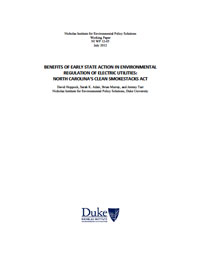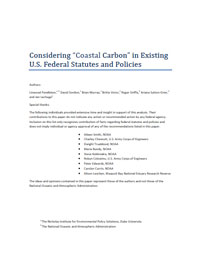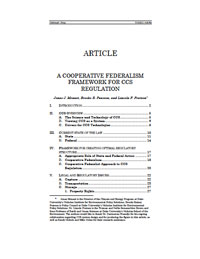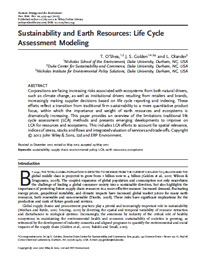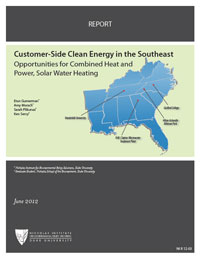Publications
Forum Summary: Socioeconomic Considerations and Human Dimensions of Fishery Management
Summary of discussion themes and guide to additional resources from the 2012 East Coast Forum.
Climate Change, Foreign Assistance, and Development: What Future for Ethiopia?
Alongside the persistent challenges of poverty and rural subsistence, many low-income countries such as Ethiopia face new problems brought by climate change and surging global economic activities. This paper by Duke University researchers examines the combined impacts of global climate change and the changing nature of donor assistance in Africa on economic development broadly and food security through the example of Ethiopia.
Benefits of Early State Action in Environmental Regulation of Electric Utilities: North Carolina’s Clean Smokestacks Act
The U.S. Environmental Protection Agency’s Cross-State Air Pollution Rule (CSAPR) and Mercury Air Toxics (MATS) Rule require power plants to install technologies that reduce sulfur dioxide, nitrogen oxide and other harmful emissions. Federal environmental regulations such as these often require compliance on restricted timelines, forcing some utilities to make significant investments over short time periods and causing sudden jumps in electricity rates for consumers. This report examines the ratepayer impacts and health benefits of North Carolina’s Clean Smokestacks Act, a law passed in 2002 requiring emission reductions similar to MATS and CSAPR. The law allowed North Carolina to stagger the cost of pollution-control technologies over a longer period and positioned the state well to comply with the EPA rules while enjoying health benefits and avoiding a sudden spike in consumer electricity rates.
Analysis of the Production and Transaction Costs of Forest Carbon Offset Projects in the USA
Forested lands in the United States represent a significant carbon sink and could play an important role in climate change mitigation. In a new article in the Journal of Environmental Management, researchers examine the costs associated with forest carbon offset project implementation and the potential for these costs to present an important barrier to private landowner participation in emerging carbon offset markets. Because of the sheer number of factors that can influence the relative and absolute costs of a forest carbon offset project, the study uses a custom spreadsheet model and accounting tool to explore implementation costs of different forest offset project types operating in different forest types under different accounting and sampling methodologies.
Near-Term Options for Reducing Greenhouse Gas Emissions from Livestock Systems in the United States: Beef, Dairy, and Swine Production Systems
Although livestock management is a small contributor to overall greenhouse gas (GHG) emissions in the United States, it makes up half of all U.S. agricultural emissions. Changes in livestock management can benefit air and water quality and help slow global climate change. The objective of this report is to synthesize and communicate the fundamental information necessary for designing agricultural GHG mitigation and reporting programs. It will be of use to private or voluntary markets and registries, commodity group and supply chain initiatives, and regulatory agencies. It summarizes strategies for managing GHG emissions from livestock systems and reviews options for quantifying and accounting for farm-scale implementation of such strategies.
Considering "Coastal Carbon" in Existing U.S. Federal Statutes and Policies
Many federal statutes and policies specifically require that impacts on ecosystem services be considered in policy implementation. Some federal policies directly include the economic value of certain ecosystem services in estimates of economic impact. Yet, we are unaware of a single federal statute, regulation, or policy that accounts directly for the carbon held in coastal habitats. Explicitly accounting for coastal carbon could change the outcome of federal policy actions for variety of federal statutes and policies, including the National Environmental Policy Act, Clean Water Act, and others. These statutes and policies allow for agency discretion in deciding which ecosystem services to include when considering alternative policies, plans, actions, and even assessments of the economic costs of damages to coastal ecosystems. Coastal carbon is an ecosystem service that could be included.
A Cooperative Federalism Framework for CCS Regulation
Coal is the dominant energy resource used for power generation across the globe, and projections suggest this will remain the case for years to come. While coal is an abundant, low-cost domestic energy resource, it is also the most carbon-intensive of all of the fossil fuels. The amount of existing coal-fired infrastructure, the ongoing importance of coal to the nation’s economy, the political support for the coal industry in the U.S. Congress, and the nation’s need for stable, affordable baseload power generation all suggest the ability to capture carbon emissions and store them in underground geologic formations—a process commonly referred to as carbon, capture, and storage, or CCS—will likely be an important option for mitigating climate change.
Sustainability and Earth Resources: Life Cycle Assessment Modeling
Corporations are facing increasing risks associated with ecosystems from both natural drivers, such as climate change, as well as institutional drivers resulting from retailers and brands, increasingly making supplier decisions based on life cycle reporting and indexing. These efforts reflect a transition from traditional firm sustainability to a more quantitative product focus, within which the importance and weight of earth resources and ecosystems is dramatically increasing. This paper provides an overview of the limitations traditional life cycle assessment (LCA) methods and presents emerging developments to improve on LCA for resources and ecosystems. This includes LCA efforts to account for spatial relevance, indices of stress, stocks and flows and integrated valuation of services and trade-offs.
Greenhouse Gas Mitigation Opportunities for Livestock Management in the United States
Although livestock management is a small contributor to overall greenhouse gas (GHG) emissions in the United States, it makes up half of all U.S. agricultural emissions. Changes in livestock management can benefit air and water quality and help slow global climate change. This brief summarizes key points from the report "Near-Term Options for Reducing Greenhouse Gas Emissions from Livestock Systems in the United States: Beef, Dairy, and Swine Production Systems," which outlines strategies for managing GHG emissions from livestock systems and reviews options for quantifying and accounting for farm-scale implementation of such strategies.
Customer-Side Clean Energy in the Southeast: Opportunities for Combined Heat and Power, Solar Water Heating
Previous analysis by Duke University’s Nicholas Institute for Environmental Policy Solutions and the Georgia Institute of Technology demonstrates how aggressive energy-efficiency policies in the South could reduce the need for new electric generation over the next 20 years, reduce water consumption, moderate projected electricity-rate increases, and create jobs. This new report builds on this work, and focuses on current clean energy opportunities within existing economic and policy constraints. Specifically, it explores two technologies: combined heat and power and solar water heating. Through four case studies, it highlights how Southeastern project managers have navigated a variety of economic, policy, and informational barriers to develop successful customer-owned clean energy installations, and offers some of the lessons these developers have learned along the way.



